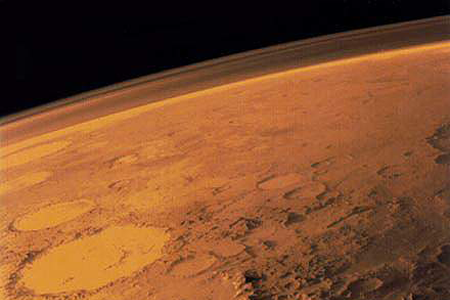Wandering Jupiter Responsible For Mars’ Small Size.

Mars isn’t as big as Earth, not by a longshot. It clocks in at 1/10th the mass, and 1/2 the size. Why is that? Did Mars not use protein shakes after powerlifting? Intergalactic anorexia? Some other poor joke? No sir. It’s because it had to contend with a roaming Jupiter back in the day.
io9:
The team ran a series of simulations that showed what would happen if Jupiter had gone walkabout during the early days of the solar system. Based on our observation of other solar systems, we have good reason to believe that giant gas planets do wander out of their orbits. While we don’t know precisely why Jupiter moved in the way that it did, this new theory provides the first cohesive explanation for why Mars is so small and why the asteroid belt is such a strange assortment of vastly different rocks.
[cont]
“If Jupiter had moved inwards from its birthplace down to 1.5 AU from the Sun, and then turned around when Saturn formed as other models suggest, eventually migrating outwards towards its current location, it would have truncated the distribution of solids in the inner solar system at about 1 AU and explained the small mass of Mars. The problem was whether the inward and outward migration of Jupiter through the 2 to 4 AU region could be compatible with the existence of the asteroid belt today, in this same region. So, we started to do a huge number of simulations. The result was fantastic. Our simulations not only showed that the migration of Jupiter was consistent with the existence of the asteroid belt, but also explained properties of the belt never understood before.”
The researchers call this the “Grand Tack Scenario”, which takes it name from the fact that Jupiter suddenly reversed course when it was 1.5 AU from the Sun, like a sailboat tacking around a buoy. These simulations seem to explain how the asteroid belt gained its weirdly bifurcated composition, in which parts of the asteroid belt are almost completely dry, while others are comet-like orbs rich in water. Jupiter’s movement through the belt would brought with it lots of stragglers from outside the asteroid belt, first comets from beyond the belt as Jupiter moved inwards towards Mars, and then the dry rocks from inside the belt as it moved back outwards again.
Jupiter. The gas giant drunken planet, rolling through the solar system eating things from your refrigerator and generally ruining the neighborhood.



